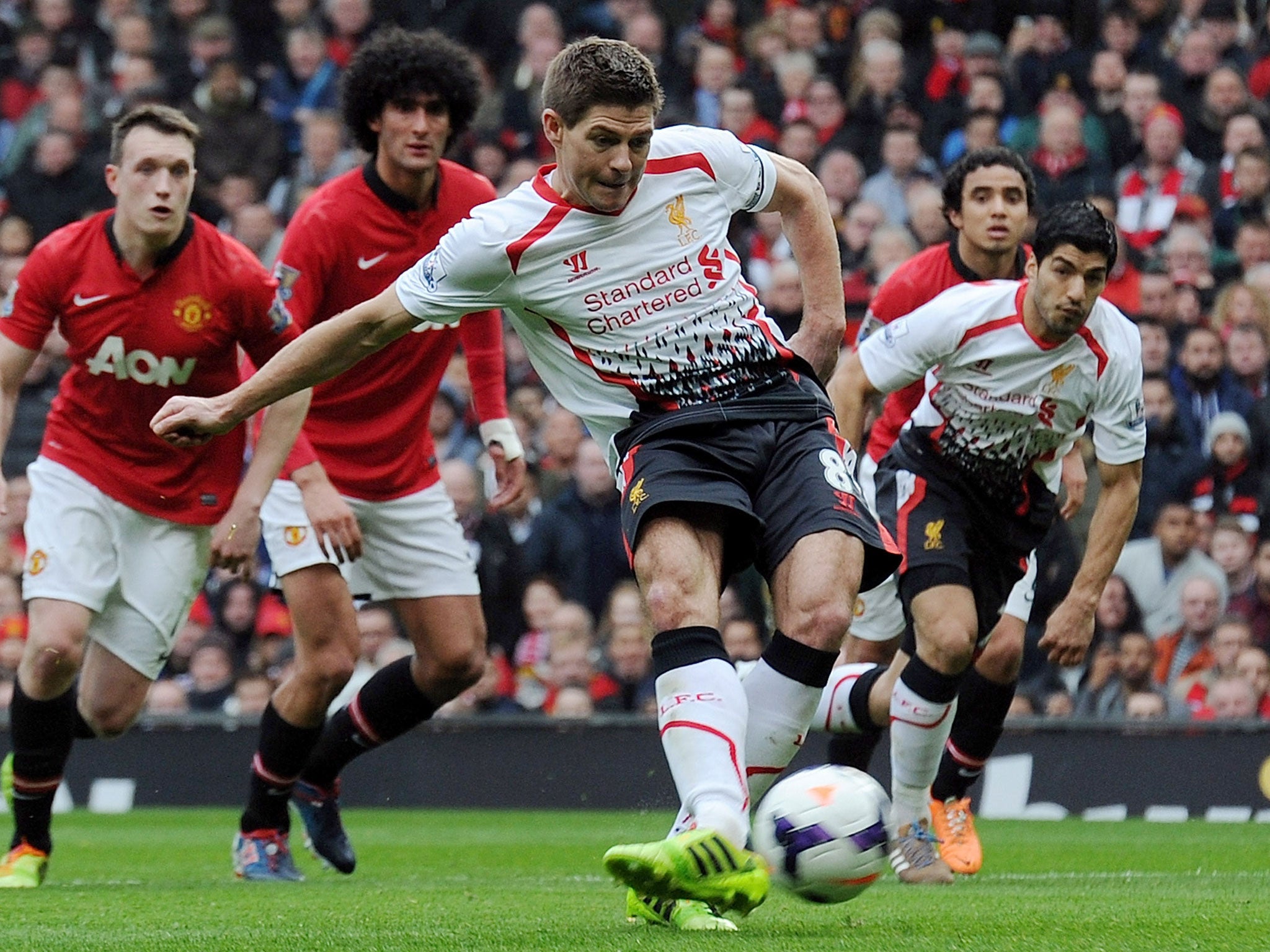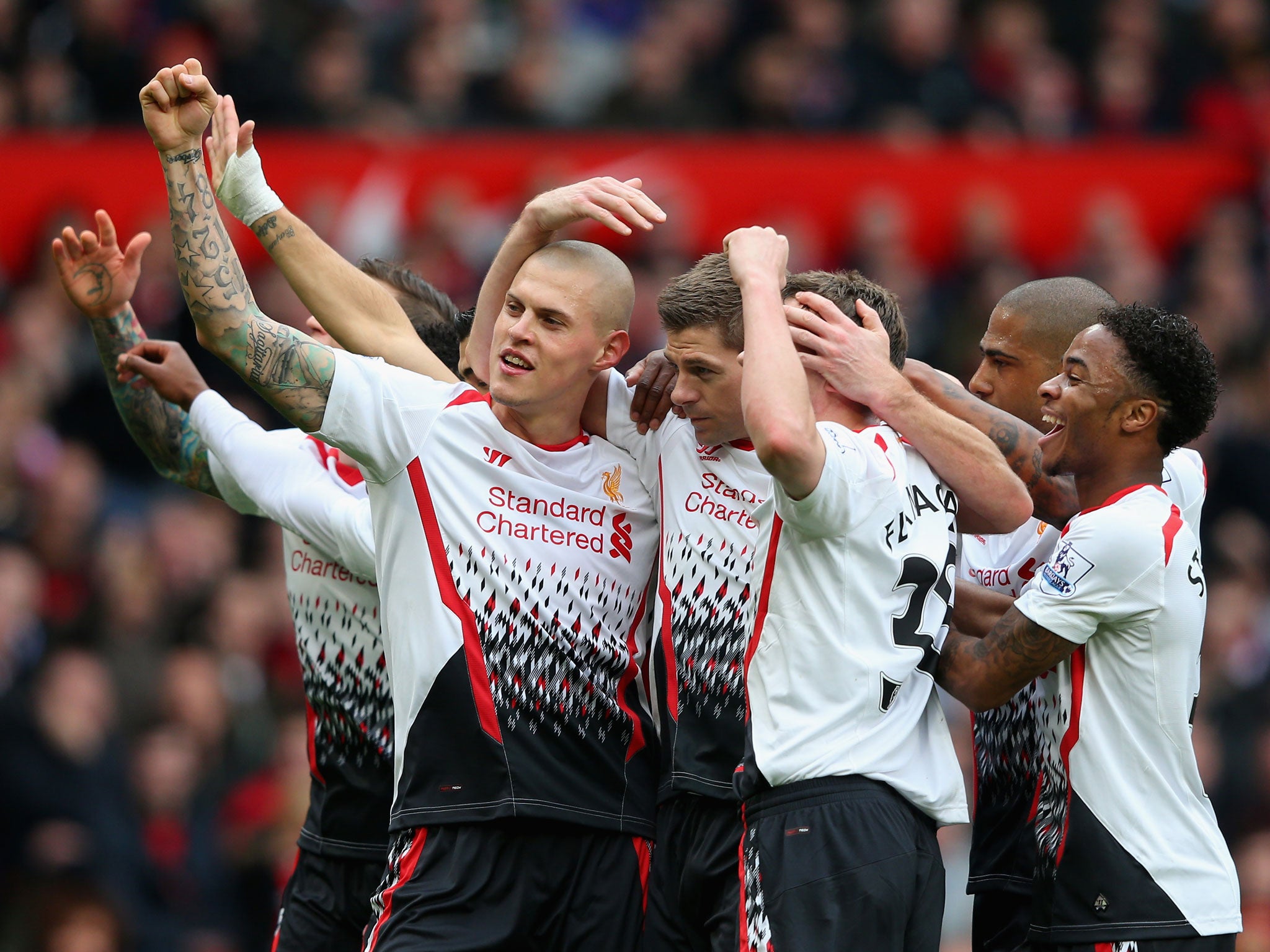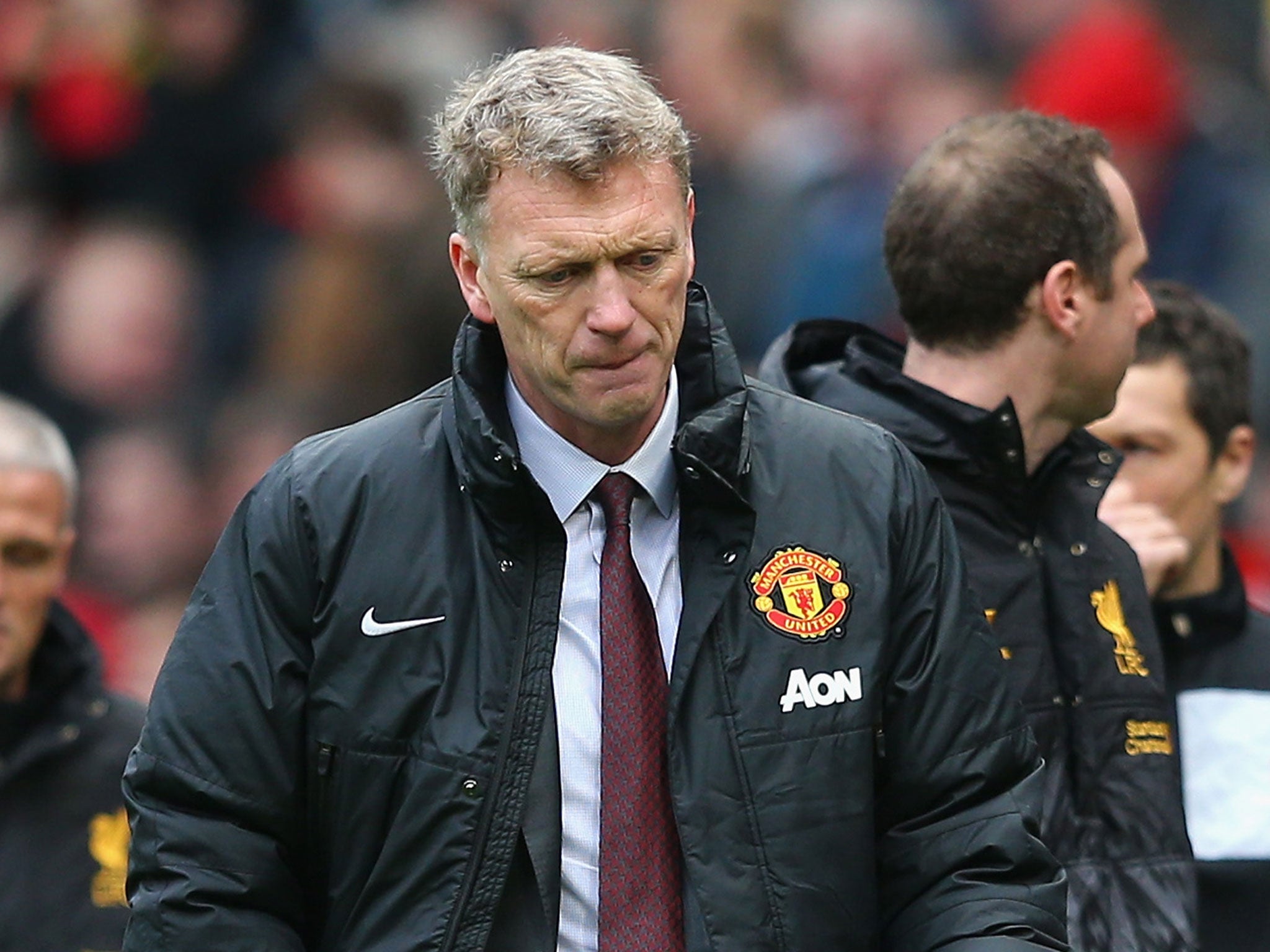Manchester United 0 Liverpool 3 - comment: Steven Gerrard dares to dream of Premier League title as power shift gains more force at Old Trafford
Midfielder scored two penalties in dominant victory at Old Trafford

Your support helps us to tell the story
From reproductive rights to climate change to Big Tech, The Independent is on the ground when the story is developing. Whether it's investigating the financials of Elon Musk's pro-Trump PAC or producing our latest documentary, 'The A Word', which shines a light on the American women fighting for reproductive rights, we know how important it is to parse out the facts from the messaging.
At such a critical moment in US history, we need reporters on the ground. Your donation allows us to keep sending journalists to speak to both sides of the story.
The Independent is trusted by Americans across the entire political spectrum. And unlike many other quality news outlets, we choose not to lock Americans out of our reporting and analysis with paywalls. We believe quality journalism should be available to everyone, paid for by those who can afford it.
Your support makes all the difference.To quote the phrase Gérard Houllier never lived down, Liverpool came to Old Trafford on Sunday 10 games from greatness and with their supporters carrying a banner that proclaimed: “Make Us Dream”.
Football dreams are thin, fleeting things. Houllier’s words from 12 years ago are remembered on Merseyside as a soundbite too far by a man whose self-belief failed to match the modern realities of Anfield. Yet he uttered those words when Liverpool were top of the Premier League and they won nine of their final 10 matches.
It was not enough; Houllier’s dreams slid through his hands and, when Manchester United staged their last game of the 2001-02 season, Arsenal’s fans unveiled another banner that stated with cutting simplicity: “Old Trafford: Champions Section.”
Steven Gerrard was part of those dreams and perhaps it is why there was a slight catch in his voice when he wondered aloud whether Liverpool could win the title this year. Sir Tom Finney is probably the greatest English footballer never to win the league but Gerrard would run him very close.

In September, before Liverpool faced Manchester United at Anfield, Gerrard gave an interview in which he conceded that he would probably never now win a championship.
The words uttered by Jose Mourinho when he tried to entice him to Chelsea in the summer of 2005 that, unless Gerrard left Merseyside, he would never know what it is to be a champion appeared to be about to be borne out. However, now there are nine games left, including the visits of Chelsea and Manchester City to Anfield next month, and if Liverpool win them all he will probably lift it at 33.
“I think we have shown we are genuine contenders, we are going to fight to the end for this,” Gerrard reflected after the most straightforward afternoon he could have known in this corner of Manchester. Even when Liverpool won 4-1 here in March 2009, a victory summed up by the sight of Fernando Torres brushing aside Nemanja Vidic as he ran through to score, Manchester United put up more resistance than they did here. They also finished the season as champions.
“I have come here many times and been played off the park,” said Gerrard. “We dominated from start to finish and we are still going away disappointed that we didn’t score more goals.”
Gerrard has now scored more goals against United than any other Liverpool player, although it will eat away at him that the penalty that would have given him a hat-trick at Old Trafford struck the foot of David de Gea’s post.
“We totally bossed the middle of the park. When you come away from home, you have to do that and we have got two of the best strikers in the world to exploit that. I am sure, if you ask the Manchester United defenders, I don’t think they will ever have had a harder 90 minutes.”
However, for United all matches at Old Trafford are now long, debilitating affairs. There was a time when winning here was the stuff of bar-room fantasies. When Middlesbrough played Manchester United at Old Trafford in December 1998, Bernie Slaven, a club stalwart and now a radio commentator, announced he would “show my a*** in Binns” – a local department store – if Bryan Robson’s Boro side won. They did, 3-2, and Slaven went into the shop window wearing a kilt. United responded by not losing another match for five months, a sequence that brought them the treble.

This season, Swansea have won at Old Trafford for the first time in their history, Newcastle for the first time since 1972, West Bromwich Albion for the first time since 1978, Everton for the first time since 1992. The spell has been smashed, just as the aura around Anfield began to crack and splinter once the giants – Alan Hansen, Kenny Dalglish and Ian Rush – had taken their leave. Mark Lawrenson commented that United’s decline might be steeper and deeper than Liverpool’s in the early 1990s and few here would doubt him.
Growing up in Utting Avenue, a decent goal-kick from Anfield, Jon Flanagan would have heard all the great Liverpool stories, particularly from his father, a trainee at Melwood who might have been part of it all if he had possessed any discipline. He was born in 1993, the year Liverpool began to nurture its history because the present was so bleak.
Brendan Rodgers remarked that Flanagan was once so little thought of that Liverpool could not arrange a loan deal for him. Now he dominated Juan Mata, a man who might replace Juan Sebastian Veron as Manchester United’s most expensive irrelevance.
Rodgers’ team may superficially resemble “The Spice Boys” of Steve McManaman and Robbie Fowler, who were the last Liverpool side to come here ahead of United in the league. Rodgers, however, points out that they have a harder core than the men whose most lasting legacy to English football were the white Armani suits they sported at Wembley in 1996. They also have an instinctive tactical discipline.
United, by contrast, were a mess. Howard Kendall, one of the few Everton managers who could claim to be more successful than David Moyes, once said that Harry Catterick’s genius was that he bought players knowing precisely where they would play. Kendall added that Moyes had signed Marouane Fellaini and then wondered where he might fit in. He appears to have done the same with Mata.
Moyes grabbed an armful of straws by noting how the Stretford End had sung to the finish, some waving their scarves above their heads, chanting that United had won the title “20 times”. Nobody had the heart to tell him that few at Old Trafford expect that total to increase under his management. Like Liverpool in their darkest moments, they were clutching their history to their breast like a crucifix.
At the end, Liverpool supporters unveiled another banner proclaiming Moyes “a football genius”. It was something they would never have done to Sir Alex Ferguson. They hated him, they feared him, but they never mocked him.
Join our commenting forum
Join thought-provoking conversations, follow other Independent readers and see their replies
Comments